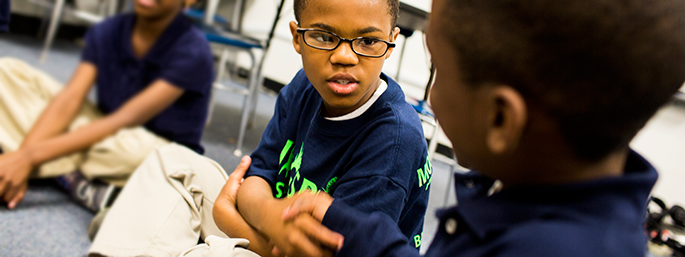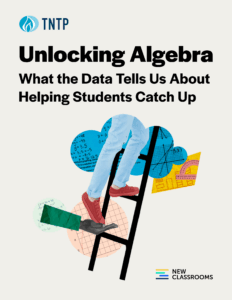There’s a lot to like about the Common Core standards, including this surprise bonus: non-educators debating what kids should learn. When I was teaching high school math in Chicago and planning how to teach, say, state standard 9.D.4, I could not have imagined that in the near future, ordinary people would be digging into content standards and discussing them on Facebook.
As a parent, I think often about what I want my own child to learn in school, and I keep coming back to a panel I attended last year at Teach For America’s annual Alumni Educators Conference. While the academic side of things remains primary and, to me, clear—students should learn rigorous math, reading and other academic content, along with music and art—a group of teachers, school leaders and parents raised some questions that have stuck with me about the challenge and importance of developing non-cognitive skills.
I expected to hear a lot about grit, but much of what was discussed were qualities that are more often thought of as values or traits than as skills—things like curiosity and kindness—and the different ways that educators have woven them into their schools.
It left me wondering: What is the role of school in fostering these types of values, and how can educators strike a balance between their primary focus on academic success and the broader goal of preparing students to be productive and participatory members of society as adults?
Plenty of traditional public schools include some sort of auxiliary “good deeds” program intended to promote an atmosphere of kindness, where students get special recognition whenever they are “caught being good.” Other schools explicitly set goals around promoting values. For example, at Henry Ford Academy Elementary School, a public charter school in Detroit, the school’s desired outcomes include developing students’ empathy and capacity for love. Students say a pledge every morning that includes promises like “allowing people to be themselves.” This isn’t what I think of as a typical non-cognitive skill, but I’m happy to see it prioritized.
Other schools formally teach and assess students’ development of non-cognitive skills. At Coney Island Prep in Brooklyn, which promotes a values system called “PRIDE” (Professionalism, Respect, Integrity, Determination and Excellence), students receive character report cards and are taught weekly ethics classes by the dean or principal. And at University Academy in Kansas City, Kellee Ransom, a 3rd grade teacher (and 2012 Fishman Prize semifinalist), tracks students’ progress on character traits just as other teachers chart growth on academic skills.
It’s not easy, however. These educators cited challenges that fell into three major groups:
Competition from cognitive skills. Educators are under pressure to show academic results, and an emphasis on standardized test gains can make it hard to carve out time. In the pursuit of student achievement gains, we sometimes forget that math and reading test scores are just one proxy for everything that kids learn at school. Ask a parent what they hope their kid learns during the day and the answer will be more complicated.
Ambiguity. Educators have clear sets of standards to teach from in English and math and clear ways to measure progress. There’s no standard set of non-cognitive skills, though, which makes it hard for districts—or even adults in a single school—to get on the same page. And even when schools focus on a specific set of traits, student character development is hard to measure. The inability to concretely track character growth makes it hard for schools to prioritize these skills.
Potential for conflict. While a value like “integrity” may sound like something we can all agree on, how that is identified and explained to kids and how it is expected to be lived throughout their school day may not match up with a particular community’s or family’s point of view. Schools that align themselves with particular values must be clear about their approach up front, so that parents know what they’re getting into. And it’s important to make a case for why the school has the values, focus, or rules that it does.
It may be hard to agree upon which traits or values are most important, as well as how they should be instilled. And it’s definitely trickier to quantify student progress in this realm than in math and reading. But that doesn’t mean they are not an important part of what kids should be learning. Our current national conversation about core academic content is critical, and it’s clear to me that we should also be asking broader questions about what else we want our children to get out of school.







